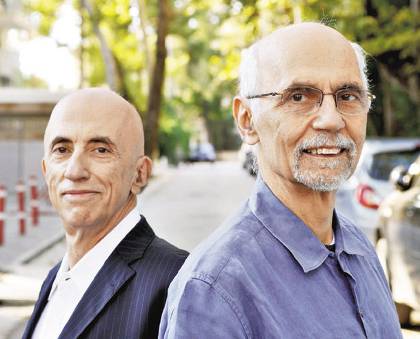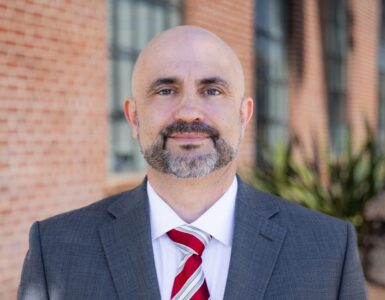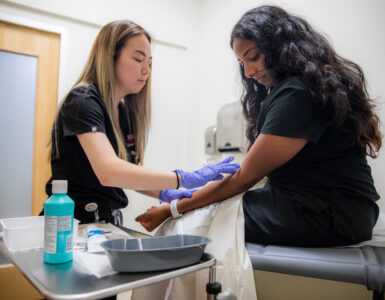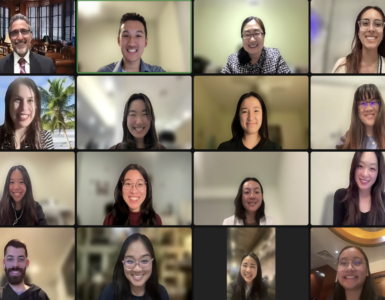
During a recent trip to Greece to deliver talks, present a paper and meet with scientists to discuss earthquake research, Menas Kafatos, Ph.D., dean of
Schmid College of Science
, and his brother, malaria expert Fotis Kafatos, Ph.D., were the subject of an in-depth profile in the Greek newspaper, “Eleutherotypia.”
The article
in the major Greek paper was titled “Two Cretans face off with the universe” and focused on the Kafatos’ childhood and early years in “the Greece of war … the Greece of poverty,” how they fled the country and went on to build scientific careers. Fotis Kafatos is presently a professor at Imperial College and ex-director of the European Molecular Biology Lab and the European Research Council.
In addition, Dean Kafatos also gave an interview on the national TV channel ENT 2 as well as an interview in the Cretan newspaper “PATRIS.”
His trip included attendance at the DEMSEE 2010 (Deregulated Electricity Market Issues in Southern-Eastern Europe) international conference in Sitia, Crete. As a panelist he also presented a paper titled “Climate Change, Energy Issues and Hazards: Regional Impacts.”
He also met with several professors and scientists from Democritus Thrace University, Institute of Geodynamics, Aristotelian University of Thessaloniki, and Institute for Space Applications and Remote Sensing, National Observatory of Athens. The scientists agreed to form a network, joining international and
Chapman University
scientists, to study DEMETER data, thermal infrared, electromagnetic signals and ground observations of potential earthquake precursors.
Dean Kafatos also gave two invited talks, one titled “Advanced Technologies for Weather and Ocean Forecasting, Earth Observations, Decision Support for Hazards, and Regional Climate Change: From California to Greece and Beyond” on Monday, at the University of Athens, Physics Department and another at the Institute for Space Applications and Remote Sensing, National Observatory of Athens. California and Greece share many similarities, including hazards such as wild fires and earthquakes, and, therefore, systems developed either at Chapman or at ISARS/NOA can benefit each other, says Dean Kafatos.
A full translation of the newspaper article provided by Dean Kafatos follows.
Two Cretans Take on the Universe
Interview by Christos Michaelides
in Oct. 10, 2010 issue of
Eleftherotypia
There is family here in Greece, including their older brother Anthony and many relatives. There is the scientific community with which they never cut contact and cooperation. And there is always Crete.
Their father, Kostas, was born in a small village in the Amari area on the southwest side of Psiloriti in Rethymno prefecture. He left there in 1920 at the age of 14 and went to America, “to learn about the world,” as he would say, and return to his homeland a learned man.
His two boys, now called “the scientists from abroad,” become one man when referring to their father. When one of them speaks (no matter which one), his voice is heard. At the same time, the other opens and closes his mouth as if saying the exact same words, regardless if they are not heard.
“He was a visionary. Ambitious, rigid, stubborn, hardworking. And he was a dreamer,” they tell me.
In other words, he had that granite personality carved over generation to generation of Greeks. He was one of those who left his homeland on foreign-bound ships with unknown destinations. But they knew very well where they were going and what they wanted to achieve.
Little money, rich life
Kostas Kafatos, knowing zero English, went to attend school in New York where he no longer had the luxury of being a kid. “His sole mission was to study. Learning,” the sons tell me with one voice. They too became emigres themselves.
As I hear their identical narratives, a picture begins to form in front of me like that of the children of many immigrants who plant themselves in our schools. These people feel obliged to succeed by some strange force (perhaps it is the fate of each immigrant).
When others were playing, “Mr. Kostas” was studying. When others rested, he worked hard.
He studied agriculture at the renowned Cornell University. He returned to his homeland when he was 30 years old and became superintendent of agriculture. His dream was to build a school of agriculture for farm kids and form plantations throughout the island.
“He never completed that last goal,” says Menas Kafatos. “And so it remains for us to do. The environment is an area where we have really committed ourselves in recent years. We want to realize this vision, especially now after the destruction of vast ranges of forests.”
In Heraklion they attended Korais School. Fotis had decided at the age of 14 that he would study biology. As soon as he graduated he left for America.
The Crete he left behind was like a promise held close inside, with love, and he awaited the day with anticipation where that love would be fulfilled.
Life in Heraklion was hard but also good. Their parents had developed a circle of friends that were scholars and people of the arts. Their mother was a teacher. In addition to his other activities, their father also had a great devotion to archeology. Every Sunday after Mass the family would visit the Archaeological Museum of Heraklion.
They met all the archaeologists who were excavating at Knossos and their circle of friends included Nikos Kazantzakis and his wife, Galatea.
They believe in Greece
“Having experienced the horrors of war, we all became anti-war. We never reconciled with the idea that differences between people and nations should be solved with guns. Inside us, of course, the love for our country always flourished. All of us, the whole family, were Venizelists. Centrists. Never right, never left. We believed and still believe deeply in the idea of Greece and in its tradition of culture. All that built the intellectual environment in which we three boys grew up.” This from Fotis, whom when we last left him he was studying biology at Cornell.
That was where Menas followed him to a few years later. He left aside his initial artistic ambitions and potential studies in Paris and chose to pursue physics, especially astrophysics.
“Fotis was always drawn to the earth. That is why he ended up in biology, sitting for hours in laboratories and studying insects and worms. But me, I turned toward the sky. I was always drawn to the galaxy. When Fotis went to America, he sent me a gift telescope and I started looking at the stars and studying them.”
Fotis was closer, scientifically, to his father. Kostas was an agriculturalist and watched whatever lived. Trees, the forest, plants, soil.
“Originally I wanted to become an archaeologist. Every Sunday we went to the museum, I noticed the seals in the ancient vessels. Through archeology I also turned to art. Biology, which I chose in the end, was not removed from those disciplines. I was always interested in and studying Ancient Greece, to see the changes in generations and how, through them, the world we live in today evolved. From there, in my green years, I have arrived today to my more mature years to deal with the idea of evolution. The evolution of the universe.”
Here, now, science comes to join faith. The Kafatos brothers are dedicated servants of the former. They do not consider anything taken for granted without proof. The “believe without research” dogma is not one they accept.
On the other hand, however, they say, “Our belief in God has to do with our culture and has become a personal experience, completely independent of our science.”
Religion is a feeling
Their “apology” starts from what the evolutionary biologist (and colleague of Fotis Kafatos) Charles Dawkins named “The God Delusion.”
“Religion is the personal matter of each person. You do not need to prove anything. It only involves what you feel, what motivates you. What gives you strength. Me, I am moved, I cry, pray and sing. These are functions that I cannot express in my science, where other emotions dominate,” says the biologist, Fotis Kafatos.
And Menas continues, he is the astrophysicist. Of the two, the more… celestial:
“Science and religion have one thing in common: love and compassion for the world. They both involve doing the best we can for our fellow man and the planet on which we live. To leave something behind as a positive contribution to the history of mankind. As the poet says, ‘To raise the sun a little higher.'”
In a recently released book,
The Grand Design
, the famous British physicist Stephen Hawking claims that “God does not exist” and that “our world does not need any God to live.”
“It is inconceivable,” he adds, “Before someone heads out to work to first seek the blessing of God.”
Menas Kafatos and Deepak Chopra wrote an article in response to Hawking. Chopra, an Indian-American, started off as an endocrinologist but eventually turned to alternative medicine and to what he calls “medicine for the body and mind.”
In their article, found online at
http://www.huffingtonpost.com/deepak-chopra/stephen-hawkings-grand-bo_b_708958.html
, they say Hawking leads “us on a journey to the very edge of nothing.”
They continue in their rebuttal to Hawking: “If ‘nothing’ gives rise to the human desire for meaning, how can it be meaningless? If the universe operates randomly, and this randomness created human brains that do all kinds of non-random things (such as writing Shakespeare and saying ‘I love you’), how can the purposeless give birth to the purposeful?”
The crisis
We had planned to ask the professors about the economic crisis, but it was not needed. What we heard from the brothers covered this topic as well only without mention of sprent, deficits, memoranda, measures, investment and development.
They are saddened by the image of “the Greek wise-guy who thinks he knows everything.” This attitude, they believe, prevents reform in areas such as asylum seeking or how students can choose who will teach them. They are worried about Greece, “a country that veered away from reading and stuck with rote memorization.”
They are concerned that no one has thought that children born today will have to “change their professional careers six times throughout their lives.” And it surprises them that we have yet to understand that “We are just homo sapiens. Not gods or anything. We just think. We have only our mind, our greatest weapon in this world” of the microcosm and macrocosm…
The ‘who’s who’ of the two brothers
Menas Kafatos
Born 1945 in Crete. Professor of Astrophysics at Chapman University in California. First degree in physics from Cornell followed by a Ph.D. from MIT in Boston. Recently dealing with climate change (appearing many times on NBC to talk about the devastating Hurricane Katrina in New Orleans and also about large earthquakes). Also works with quantum mechanics, which he considers “the only science so far that has proven almost impossible to reverse.”
Fotis Kafatos
Born in 1940 in Crete. Professor of Biology at London’s Imperial College. He was one of the founders of the European Research Council. He is very proud of the work being done there, something he considers “an area of European science.” He says, “We support the thinking being, he who has the God-given gift of thought and the desire to investigate.” He has dealt particularly with the development of malaria which still kills 1-3 million people every year, mostly young children in sub-Saharan Africa. He got his first degree at Cornell and went on to get his doctorate at Harvard. He has taught at the Universities of Athens and Crete, and is considered the “father of biology in Greece.”




[…] blog: Dean Kafatos and brother profiled in leading Greek newspaper from → Center of Excellence in Earth Observing, School of Earth & Environmental […]